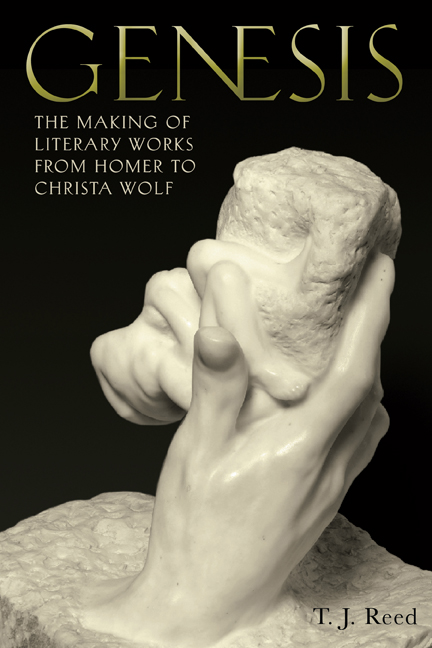Book contents
- Frontmatter
- Dedication
- Contents
- Note on Quotations and Translations
- Preface
- Introduction: Processes
- Part I Antiquity
- 1 Homer's Audiences: Shaping the Iliad (and the Odyssey)
- 2 Fourfold Genesis: The Bible between Literature and Authority
- Part II Early Modern
- 3 An Alphabet of Experience: Montaigne
- 4 Beginner's Luck: Shakespeare's History Cycles
- Transition—Tradition
- Part III Goethe
- 5 Cross-Purposes: Goethe's Faust
- 6 Occasions: Goethe's Lyric Poetry
- 7 Live and Learn: Werther and Wilhelm Meister
- Part IV Nineteenth- and Twentieth-Century German
- 8 Writing on the Run: Georg Büchner's Revolutions
- 9 “The Best-Laid Schemes…”: Thomas Mann Unplanned
- 10 Description of a Struggle: Kafka's Half-Escape
- 11 Atomic Beginnings: Brecht, Galileo, and After
- 12 Knowing and Partly Knowing: Paul Celan's Mission
- 13 Christa Wolf: A Fall from Grace
- Afterword
- Notes
- Bibliography
- Index
7 - Live and Learn: Werther and Wilhelm Meister
Published online by Cambridge University Press: 16 September 2020
- Frontmatter
- Dedication
- Contents
- Note on Quotations and Translations
- Preface
- Introduction: Processes
- Part I Antiquity
- 1 Homer's Audiences: Shaping the Iliad (and the Odyssey)
- 2 Fourfold Genesis: The Bible between Literature and Authority
- Part II Early Modern
- 3 An Alphabet of Experience: Montaigne
- 4 Beginner's Luck: Shakespeare's History Cycles
- Transition—Tradition
- Part III Goethe
- 5 Cross-Purposes: Goethe's Faust
- 6 Occasions: Goethe's Lyric Poetry
- 7 Live and Learn: Werther and Wilhelm Meister
- Part IV Nineteenth- and Twentieth-Century German
- 8 Writing on the Run: Georg Büchner's Revolutions
- 9 “The Best-Laid Schemes…”: Thomas Mann Unplanned
- 10 Description of a Struggle: Kafka's Half-Escape
- 11 Atomic Beginnings: Brecht, Galileo, and After
- 12 Knowing and Partly Knowing: Paul Celan's Mission
- 13 Christa Wolf: A Fall from Grace
- Afterword
- Notes
- Bibliography
- Index
Summary
Matters of Life and Death
JUST HOW FAR GOETHE'S poetic substance grew out of the substance of his own life was shown and confessed in his sensational first novel. In 1772 a colleague at the Imperial Court at Wetzlar, Karl Wilhelm Jerusalem, was driven to suicide by social and career frustrations and unhappy love for a married woman. In the same place and time Goethe was smitten with the likewise unavailable fiancée of another colleague, Johann Christian Kestner. The following year he wrote The Sufferings of Young Werther, inspired, after that period of gestation, by the shock of Jerusalem's death, down to minute detail: the culminating scenes are an extensive montage of Kestner's letters recording the circumstances of the suicide and the burial. Some of the most moving passages in all of German prose are Kestner's formulations that Goethe borrowed verbatim: creativity lay in seeing the potential of sober report to make a somber ending after so much high emotion. Less was more.
Goethe's infatuation with Kestner's Charlotte gave him empathy with the dead man's situation: “I have added my feelings to his story, and so it makes a marvelous whole”—to be precise, it makes a lyrical prose narrative of a man overwhelmed at the novel's happy beginning by the beauty of the natural world, then as the mood darkens, overwhelmed by its implacable destructiveness; first ecstatic at the deep affinity he feels with Lotte, then in despair as she dutifully represses the love for him that he is rightly sure she feels. All this is conveyed wholly by Werther's letters to a never-heard correspondent: a one-way epistolary novel. At the end, an “Editor's Report” maintains the fiction of real documents assiduously brought together by this anonymous author since Werther's death.
The closeness to the lives of four real people became widely known, generating a public interest in proportion to the novel's sensational success. That was potentially embarrassing for the Kestners, though in the end they took it well. “If you could feel the thousandth part of what ‘Werther’ is for a thousand hearts,” Goethe cajoled them, “you wouldn’t count the cost of what you’ve contributed.” For Lotte “to know her name is being pronounced with reverence by a thousand sacred lips is surely compensation for any concerns.”
- Type
- Chapter
- Information
- GenesisThe Making of Literary Works from Homer to Christa Wolf, pp. 146 - 160Publisher: Boydell & BrewerPrint publication year: 2020



